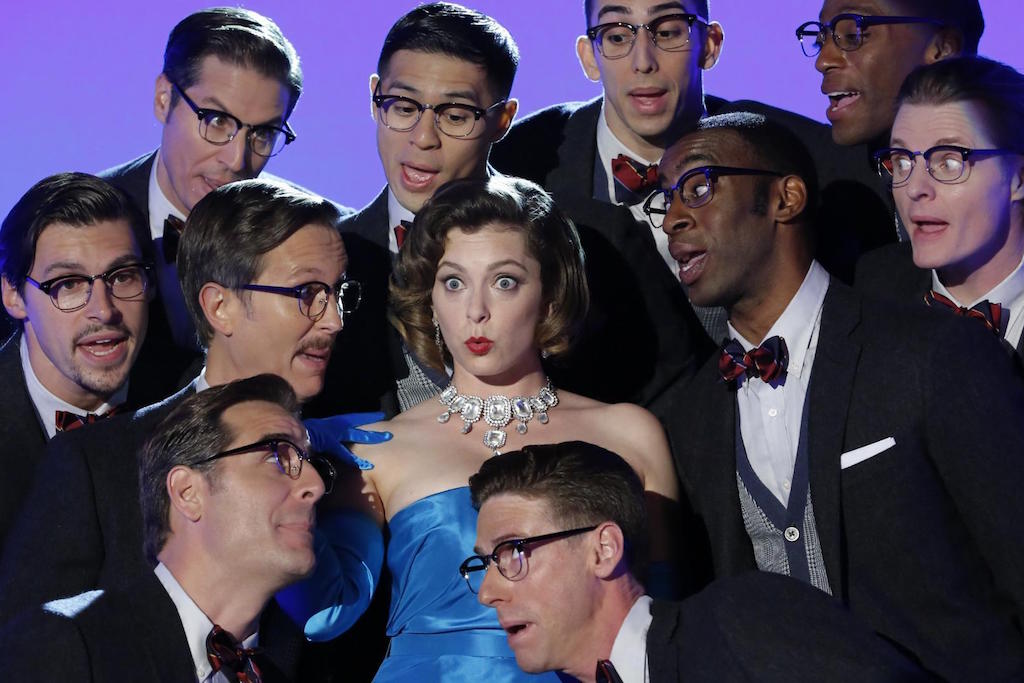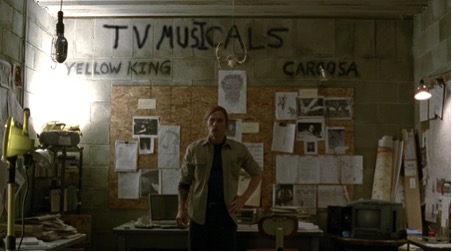How TV Became The New Home Of The Musical
'Crazy Ex-Girlfriend' is doing all the same stuff as 'La La Land' (but way better).

The musical is back! That’s what the creators of the award season darling La La Land want you to think. La La Land has homages to old Hollywood and new songs, it has dazzling dance numbers and endless joy for the form while telling a modern love story that isn’t so sweet. But is it really the tap dancing knight in a shining tuxedo? Did the musical ever actually leave?
Think about the big musical moments from the past 15 years. Immediately, the genius of Crazy Ex-Girlfriend springs to mind. The brilliance of The Flight of the Conchords and the jukebox bliss of Glee warrants a mention too. There was the wild experiment of Smash; Netflix tried it with The Get Down; and you also can’t forget the trashy delights of Nashville and Empire.
If you were to pin these titles on a board and stand back to examine it like you’re hunting a serial killer, one would proclaim: “my god, they’re all… television shows.”

At The Movies
The film musical landscape certainly hasn’t been barren (fellow musical nerds, don’t @ me). After Oliver! won the Best Picture Oscar in 1968, another movie musical didn’t take the award until Chicago in 2003; but this led a revitalisation of the form. Off the back of this success, Hollywood green-lit adaptations of The Producers, Rent, The Phantom of the Opera, Dreamgirls, Hairspray, Sweeny Todd and Mamma Mia (all Broadway musicals).
There has also been a steady flow of original movie musicals with the magnificent Sing Street and Moana hitting cinemas last year. Before that, The Princess and the Frog, Pitch Perfect, Enchanted, Frozen and Tangled all made their mark. But if you remove Disney from the picture, tumbleweeds start rolling through.
On the theatrical side, Broadway will always be the Plymouth Rock for musicals, but how many modern ones actually go on to become a phenomenon? Since 2000, hit Broadway shows that aren’t a revival or based on a pre-existing film, TV or book, include Hamilton, Book of Mormon, Jersey Boys and Avenue Q. It’s rare for a musicals to become a sensation beyond its lifespan in New York. It feels like these shows represent a surge in original hit musicals, but they don’t land as frequently as you might think.
Due to the volatility and high rate of failure for most Broadway shows, it’s a safe bet for producers to invigorate a classic rather than to take a chance of the next Lin-Manuel Miranda. The same goes for adapting these juggernaut productions into movies. The process can take years. The widely popular Wicked debuted in 2003, and after a tumultuous road to getting a movie adaption; it finally has a tentative commitment to being made in 2019.
Then Along Came TV
Television has become the new home of musicals because it’s the medium willing to take risks and innovate. Musical elements have always played into shows over the years; the best example being the iconic Buffy The Vampire Slayer episode ‘Once More, With Feeling’. But there was never a dedication to making an entire musical series throughout the 1990s — standalone episodes were it. Going back further from the ’90s, the rarity is BBC’s The Singing Detective from 1986.
Movie musicals are now in the same position as adult dramas were in the 2000s, when film studios began axing dramatic titles from their development schedules in favour of franchise blockbusters. Though La La Land was poised to take out the Best Picture Oscar, it doesn’t mean the film musical landscape has been healthy. It’s an exception.
La La Land is a high-profile attempt but not every studio us making live-action musicals, so it can coast by on being relatively unique. Sing Street was made outside Hollywood in the UK, and Moana ticks the box for Disney’s annual animated musical. There hasn’t been a surge to make live-action musicals in the past decade akin to the way studios rushed to make superhero movies.
The creatives frustrated by the shift in the ‘00s went to television and were embraced by networks like HBO, which drove the golden age of television that is going into overdrive in 2017. The television musical became viable during this time because networks were willing to try anything Hollywood was terrified of pursuing. It was during this time that HBO produced Flight of the Conchords — a musical miracle about two relatively unknown comedians from New Zealand living in New York.
Television musicals flourish because they allow the songs to push the story forward with zero room for filler. Most movie musicals are structured to allow for a musical number every 10-15 minutes; they end up working to hit quotas rather than growing organically with the needs of the story. The TV musical is ruthless with what makes the songbook. Considering the shorter run-time of TV, writers can cover a lot of plot with one song, thus musical numbers are honed to perfection — the songs matter in each episode.
The lower budget of television also forces writers and directors to execute their ideas with every resource available, so there’s an incredible amount of ingenuity involved in pulling these shows together and crafting each musical number.
“Settle For Me”
If you compare La La Land to the landscape of television musicals currently on offer it comes across as somewhat hollow. La La Land has the nostalgia for old school Hollywood musicals, but it doesn’t know how to leverage each reference into something that matters in the scope of the plot or plight of each character. Ryan Gosling hangs off a lamppost in reference to Singin’ in the Rain… and that’s it! La La Land is constantly nudging you going: “Remember this? Remember? ‘MEMBER?”
In Crazy Ex-Girlfriend, Rebecca Bunch (Rachel Bloom, the star, co-creator and head songwriter) is caught in a love triangle while trying to woo her ex-boyfriend. The new man in her life (Santino Fontana, Hans from Frozen) pitches himself in the musical number ‘Settle for Me’. Not only is it a charming throwback to a Ginger Rogers and Fred Astaire-style song and dance number — it’s telling a story in the process. It deconstructs the romantic fantasy of old Hollywood musicals by emphasising love as a compromise.
In the second season of Crazy Ex-Girlfriend, Bloom takes her mastery of the musical (and nostalgia) to a new level with the Marilyn Monroe-inspired ‘The Math of Love Triangles’ and the toe-tapping ‘We Tapped That Ass’. Bloom is taking familiar elements of musicals and flipping it into something new.
Glee worked in a similar way to Crazy Ex-Girlfriend but it re-contextualised the meaning of the songs it covered. In the pilot episode, when the group is at their lowest, they sing Journey’s ‘Don’t Stop Believing’ as a battle cry. The final scene killed any cynicism around whether a jukebox musical could work on TV and became the major selling-point of the series that lasted six seasons.
Even television shows that aren’t musicals are managing to produce memorable songs. The Netflix series Wet Hot American Summer: The First Day of Camp put Chris Pine on a roof with an electric guitar and created magic.
Another Netflix series, Love, featured an impromptu version of Wings’ ‘Jet’.
Television has also made the musical more accessible than ever. You need to max out a credit card to get tickets to most Broadway shows. Even the touring companies that make it to Australia are pricey. A stall seat to see Book of Mormon in Australia can cost anywhere from $50-278. Movie musicals cost the standard cinema ticket price but you’d be lucky to get three per year — if any at all.
Television has a steadier flow of musicals now if you need a fix, and they are delivering with quality productions. The American networks have even started getting into the live-musical game. Since 2013, NBC and Fox have produced adaptations of: Hairspray, Grease, Peter Pan, The Wiz and The Sound of Music. These productions have been an attempt to pull people away from streaming services and back to live television. They capitalise on social media with most people reacting to the hits and misses in real-time.
Grease Live, directed by the same brains behind Hamilton, is one of the best examples of how great these event musicals can be. I still can’t figure out how they did a majority of the costume changes in the ‘Greased Lightning’ number.
While La La Land is taking all the credit for musicals at the moment, television has been keeping the flame alive and producing some of the best original modern musicals of the 21st century so far.
–
Cameron Williams is a writer and film critic based in Melbourne who occasionally blabs about movies on ABC radio. He tweets from @MrCamW.